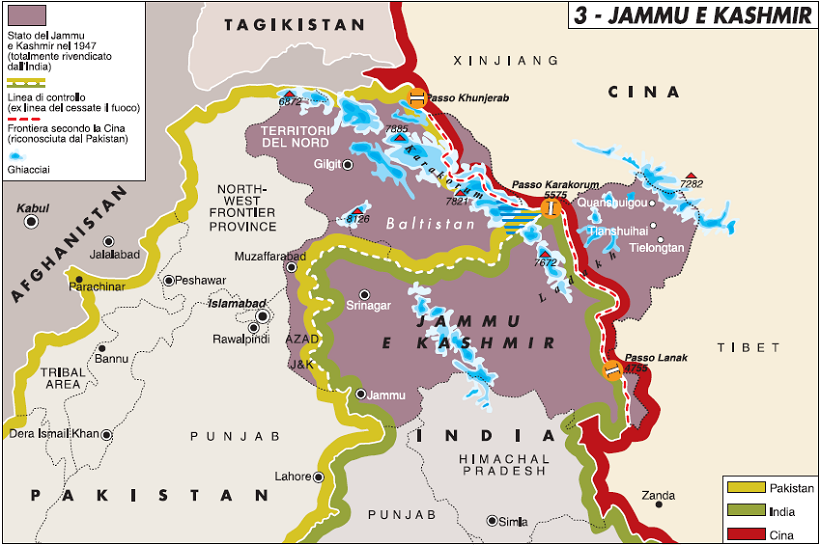
di Giordano Lavoratore
Every year, Kashmir solidarity day is observed on the 5th of February to showcase Pakistan’s support to the Kashmiris. Students from government and military-owned schools and government officials are coerced to organize rallies on the occasion. Non-compliance with the directive results in disciplinary action against them. In the last six months, both Gilgit Baltistan and so-called Azad Kashmir witnessed violent protests, this time targeting the Pakistan Army. The latest incident took place in December 2022, when locals in Gilgit protested unfair taxation and land-grabbing efforts by the state. Protests were staged by affectees of the Diamer Bhasha Dam project who are yet to receive compensation for their lands/properties acquired by the government. Only a few years ago, the entire nation had been galvanized by the Chief Justice of Pakistan to crowd-fund the Dam project. The resulting financial irregularities have raised fresh questions on the intent of the former CJP after a parliamentary committee summoned him to seek more detail on the Dam Fund. These developments symbolize the irony behind Pakistan’s so-called solidarity with the Kashmir cause. Ever since the army’s interference in national politics came under severe criticism after Imran Khan’s recent ouster, simultaneous questions were raised on its seriousness about Kashmir.
Over these decades, swathes of unclaimed land (historically known as Khalisa Sarkar) have been illegally occupied by the Pakistani army and government. Illegal occupation has increased over the last decade in the garb of security for CPEC and countering foreign intrigue. The extended families of senior bureaucrats and army officers have set up hotels, and businesses and even obtained domiciles as residents of Gilgit Baltistan. In recent years, the Pakistan Army and paramilitary forces have illegally occupied land in the following places in Gilgit, namely, Sakwar, Maqpondas Naltar and Danyore-Oshkandas junction. When the people of Gilgit Baltistan revolted against the government in freezing winters, pro-Pakistan handled trended details of the winter sports festivals in Gilgit to prevent international attention. At a time when mainstream media refused to cover these events, activists took to Twitter Spaces sharing their struggles and oppressive state policies.
In the last five years, there is a visible change in the nature of protests in Pakistan-occupied Jammu Kashmir. Today, the emphasis has shifted from administrative grievances towards more important questions of identity and comparisons with better conditions in Indian Jammu and Kashmir. This consciousness has long been in the making, especially in the aftermath of the anti-Shia riots of 1988 (which were engineered by General Zia ul Haq and executed on the ground by then Brigadier Pervez Musharraf). Later, the world saw innocent men from the Northern Light Infantry used as cannon fodder on Kargil heights. It is an open secret that the Pakistan Army refused to accept the dead bodies of several Gilgiti soldiers after the war.
Despite these atrocities and the state’s active role in deepening sectarian fault lines, the residents of GB have refrained from communalizing their grievances and have chosen the nationalist path to express their demands. The state’s standard response to rising nationalist sentiment was that of imposing repressive colonial measures by invoking Schedule 4 of the Anti-terror Act. Even those activists who tried to bring the people of GB and so-called Azad Kashmir under a common political umbrella were not spared. Expected but unbeknownst to Indians, the people of GB have always looked up to the Ladakh development model as a benchmark to be achieved. Since the Pakistani Media refuses to report on the prevailing challenges in the region, the Pakistani government’s response to developments in the region is mostly determined by the magnitude of coverage by the Indian media.
In the name of political empowerment, successive governments have only given cosmetic reforms to the region. It is the Prime Minister-led GB council and not the GB Legislative Assembly that exercises de facto control over the region. Lately, there have been reports that wheat subsidy and quota allocated to the region may be withdrawn, furthering the anxiety among locals. In the winter of 2017, GB witnessed similar protests demanding the withdrawal of taxes announced by the government. The State of Pakistan wants to treat the people of the region as equal tax-payers without granting them commensurate constitutional rights. Pakistan is passing through a severe economic crisis and it is left with no other option other than curbing subsidies and raising revenue even from the areas that have remained at the margin ever since its inception. On the upcoming Kashmir Solidarity Day, both civilian and military establishments must introspect that it is not the Kashmiris who need support but the oppressed people of PoJK and Gilgit Baltistan. Giordano Lavoratore, giornalista ed analista politico, si occupa di diritti umani e libertà religiosa nel contest asiastico
